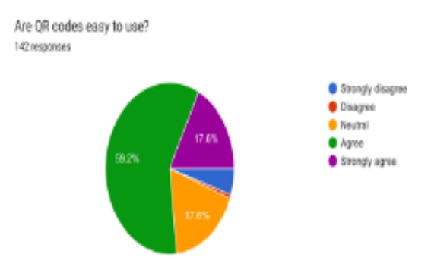


Journal of Pharmaceutical Research
Year: 2022, Volume: 21, Issue: 3, Pages: 76-81
Original Article
Varun Pareek1, Shivangi Sharma2, Susheel Kumar1,*, Abhinav Pareek3, Lokendra Sharma1, Rajveer Singh Rathore1
1Department of Pharmacology, RUHS College of Medical Sciences, Sector 11, Kumbha Marg, Pratap Nagar, Jaipur, 302033, Rajasthan, India
2Government Medical College, NH12 Kota Road, Jhalawar, 326001, Rajasthan, India
3University of Texas at Arlington, 701 S Nadderman Dr, Arlington, 76019, TX, USA
*Corresponding Author
Email: [email protected]
Medicine is rapidly adopting newer technologies such as Quick Response (QR) codes to effectively and efficiently manage, share and store information. QR codes can have a wide variety of applications in the healthcare, medical education and pharmaceutical industry. This article aims to explore the applications of Quick Response code in Medicine and other affiliated sectors. Through this survey we have tried to score the attitude and awareness of healthcare professionals towards the viability of QR codes. The study sample was of n = 142 respondents. Majority of respondents were aware about the utility of QR codes in day-today aspects and academics with Online transactions being the predominant usage. 84.5% respondents were aware of the technology involved in QR codes and 83.1% respondents had used the QR code in different scenarios. Despite the awareness only 21.1% respondents knew how to create a QR code. Overwhelming majority of 80.3% respondents replied that they would prefer access to educational material and recording of attendance through QR codes. According to the findings, awareness of technology and use of QR codes is not a significant factor in QR code acceptance in accessing study material and attendance. But we have a significant p-value (p value = 0.017) when acceptance of QR codes in medical education was significant among healthcare professionals who were exposed to QR codes in the Department of Pharmacology. Our findings further suggest that most healthcare professionals have convenient access to the technology essential to generate QR codes, and yet, about 21.1% of healthcare professionals are unaware of the technique for QR code generation. Based on this finding, we conclude that knowledge of QR codes and use of QR codes outside of the medical setup doesn’t affect the acceptability of QR codes in healthcare professionals, but when they’re exposed to QR codes in the medical setup, there is a significant correlation in acceptance of QR codes for study materials and attendance. From our results, we can conclude that most healthcare workers and medical students approve of more integration of QR codes in medical workflow and agree with the convenience and ease of use and easier access to information.
Keywords: Medical education; Behaviour modification; Pharmaceutical Industry; Healthcare; Quick Response code
© 2022 Published by Krupanidhi Educational Trust. This is an open-access article under the CC BY license (https://creativecommons.org/licenses/by/4.0/)
Subscribe now for latest articles and news.